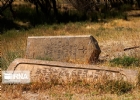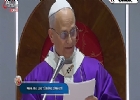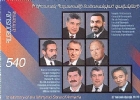
English :
26 Ağustos 2020
![]()
![]()
![]()
UCLA Promise Armenian Institute to Host First Distinguished Lecture Series - 
The UCLA Promise Armenian Institute, in collaboration with the National Association for Armenian Studies and Research (NAASR), the Ararat-Eskijian Museum, the UCLA Richard Hovannisian Endowed Chair in Modern Armenian History, and the UCLA Center for Near Eastern Studies, will present the first in its Distinguished Lecture Series, “When Was the Decision Made to Annihilate the Armenians?,” to be delivered by Professor Taner Akçam of Clark University. The webinar will take place on Monday, September 14 at 11 a.m. Pacific Daylight Time (2 p.m. Eastern Daylight Time) via the Zoom platform. Professor A. Dirk Moses of the University of North Carolina at Chapel Hill will serve as the discussant for this lecture.
Registration for this webinar is required and free. Once registered, the participant will receive a unique link to the Zoom webinar.[Telegram from one of the main architects of the Armenian Genocide]Telegram from one of the main architects of the Armenian Genocide
In this presentation, Professor Akçam will introduce some newly unearthed documents from the Ottoman archives in Istanbul that indicate that the first decision to exterminate Armenians was taken on December 1, 1914, well before most scholars in the field ever suggested. In these documents, the Turkish term for extermination [imha] is openly used by local governors who were directly involved in the decision-making process to exterminate the Armenians. Akçam will also introduce a letter dated March 3, 1915, written by Bahaettin Şakir, the head of Teşkilat-ı Mahsusa (aka the Special Organization) and one of the main architects of the Armenian Genocide. This letter conveys that the Central Committee of Union and Progress had already decided to exterminate the Armenians, giving the government wide authority to implement this plan. The scholarly world has long ignored or declined to cite this letter due to allegations that it was fake. Drawing on newly available documents, Akçam will show the authenticity of this letter and argue that the question of the decision(s) for the extermination of Armenians and the role of governors should be revisited.
Taner Akçam is the Kaloosdian and Mugar Chair in Modern Armenian History and Genocide in the Strassler Center for Holocaust and Genocide Studies at Clark University. Akçam is widely recognized as one of the first Turkish scholars to write extensively on the Ottoman-Turkish Genocide of the Armenians in the early twentieth century. His latest book is Killing Orders: Talat Pasha’s Telegrams and the Armenian Genocide (Palgrave 2018). He is the founder of Krikor Guerguerian Online Archive.
A. Dirk Moses is the Frank Porter Graham Distinguished Professor of Global Human Rights History at the University of North Carolina at Chapel Hill, arriving in July 2020. Raised in Brisbane, Australia, he was educated at the Universities of Queensland (B.A. 1987), St. Andrews (M.Phil. 1990), Notre Dame (M.A. 1994), and University of California, Berkeley (Ph.D. 2000). His first book, German Intellectuals and the Nazi Past (2007), was awarded the H-Sozu-Kult ‘’Historical Book of the Year’’ prize for contemporary history. Moses has also written extensively about genocide, memory, and global history. Prof. Moses’s latest book, The Problems of Genocide: Permanent Security and the Language of Transgression is in press with Cambridge University Press.
The Promise Armenian Institute (PAI) was established at UCLA in late 2019 as a hub for world-class research and teaching on Armenian Studies and for coordinating Interdisciplinary Research and Public Impact Programs across UCLA, and with the Republic of Armenia and the Armenian Diaspora.
Registration for this webinar is required and free. Once registered, the participant will receive a unique link to the Zoom webinar.[Telegram from one of the main architects of the Armenian Genocide]Telegram from one of the main architects of the Armenian Genocide
In this presentation, Professor Akçam will introduce some newly unearthed documents from the Ottoman archives in Istanbul that indicate that the first decision to exterminate Armenians was taken on December 1, 1914, well before most scholars in the field ever suggested. In these documents, the Turkish term for extermination [imha] is openly used by local governors who were directly involved in the decision-making process to exterminate the Armenians. Akçam will also introduce a letter dated March 3, 1915, written by Bahaettin Şakir, the head of Teşkilat-ı Mahsusa (aka the Special Organization) and one of the main architects of the Armenian Genocide. This letter conveys that the Central Committee of Union and Progress had already decided to exterminate the Armenians, giving the government wide authority to implement this plan. The scholarly world has long ignored or declined to cite this letter due to allegations that it was fake. Drawing on newly available documents, Akçam will show the authenticity of this letter and argue that the question of the decision(s) for the extermination of Armenians and the role of governors should be revisited.
Taner Akçam is the Kaloosdian and Mugar Chair in Modern Armenian History and Genocide in the Strassler Center for Holocaust and Genocide Studies at Clark University. Akçam is widely recognized as one of the first Turkish scholars to write extensively on the Ottoman-Turkish Genocide of the Armenians in the early twentieth century. His latest book is Killing Orders: Talat Pasha’s Telegrams and the Armenian Genocide (Palgrave 2018). He is the founder of Krikor Guerguerian Online Archive.
A. Dirk Moses is the Frank Porter Graham Distinguished Professor of Global Human Rights History at the University of North Carolina at Chapel Hill, arriving in July 2020. Raised in Brisbane, Australia, he was educated at the Universities of Queensland (B.A. 1987), St. Andrews (M.Phil. 1990), Notre Dame (M.A. 1994), and University of California, Berkeley (Ph.D. 2000). His first book, German Intellectuals and the Nazi Past (2007), was awarded the H-Sozu-Kult ‘’Historical Book of the Year’’ prize for contemporary history. Moses has also written extensively about genocide, memory, and global history. Prof. Moses’s latest book, The Problems of Genocide: Permanent Security and the Language of Transgression is in press with Cambridge University Press.
The Promise Armenian Institute (PAI) was established at UCLA in late 2019 as a hub for world-class research and teaching on Armenian Studies and for coordinating Interdisciplinary Research and Public Impact Programs across UCLA, and with the Republic of Armenia and the Armenian Diaspora.
Bu haber asbarez kaynağından gelmektedir.
Haber metninde yer alan görüşler haber kaynağı (asbarez) ve yazarına ait olup,
bolsohays.com sitesi haber hakkında herhangi bir görüş üstlenmemektedir.
Opinions expressed are those of the author(s)-(asbarez). They do not purport to reflect the opinions or views of bolsohays.com
Diğer Haberler
-
Ohanian Becomes First Armenian-American to Receive Best Picture Oscar Nomination
-
Pashinyan Announces Beginning of Renewal of Armenian Apostolic Church
-
Azerbaijan-Armenia normalization push set to carry into 2026
-
Pashinyan Urges Karabakh Armenians to Embrace Armenian Citizenship for Security
-
Armenia adopts universal healthcare insurance
-
Armenia pays mothers $1,300 for each child born
-
Photography of Ancient Armenia Featured in New 2026 Wall Calendar
-
Pope asks for prayers ahead of visit to Türkiye and Lebanon
-
Armenia will step up its efforts toward membership in the European Union in 2026
-
Economy Minister discussed rebranding of Armenian brandy with producers
-
Aleppo - Yerevan - Aleppo
-
Mirzoyan: Armenia citizens should live in Armenia, Azerbaijan citizens should live in Azerbaijan
Foto Galeri Tüm Galeriler
Video Galeri Tüm Videolar
Anket Tüm Anketler
Günün Sözü
Մարդս ազատ ստեղծուած է. ան ազատ է եթէ նոյնիսկ շղթաներու մէջ ծնած ըլլայ։


















